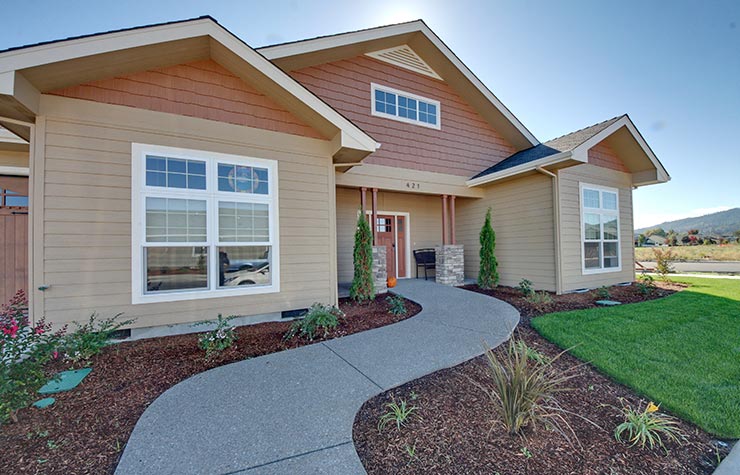AARP Hearing Center


The vast majority of older adults have told AARP that they want to "age in place" by remaining in their current home and neighborhood.
But much of the U.S. housing stock isn't very aging-friendly (stairs are an example), and millions of older Americans face economic hardships that challenge their ability to afford the costs of safe and suitable housing.


Home Sharing
- Download the Airbnb report "Home Sharing: A Powerful Option to Help Older Americans Stay in their Homes"
(Scroll down to learn about the webinar panelists.)
The rise of home sharing — in which a property owner or resident rents space to a traveler or short-term tenant — is allowing people of all ages, and especially older adults, to literally earn an income from where they live. (Note: The terms "home sharing" and "house sharing" are also used to describe arrangements involving people who live together and share expenses as roommates.)
According to the report "Home Sharing: A Powerful Option to Help Older Americans Stay In Their Homes," produced by the online home sharing platform Airbnb, older adults — and especially women age 60 and older — make up the largest demographic of its hosts. The home sharing business model enables older property owners to not have to "downside and leave the homes they love; stay in their homes and experience excessive financial strain; or rely on lending instruments such as reverse mortgages," writes the report's author Gene Sperling, an economist and consultant to Airbnb.
According to the report:
- The average Airbnb host age-65+ earns $8,350 in supplemental income annually for a single property.
- Nearly 60 percent of older adults report that income from Airbnb hosting has helped them stay in their homes, 13 percent report that hosting has helped them avoid foreclosure, 35 percent said hosting helped them avoid eviction.
- More than 60 percent of older adults report that hosting has positively changed the way they think, and 45 percent say hosting has positively affected the way they interact with their community.
- Older women are rated the best Airbnb hosts in the U.S. with 63 percent of trips hosted by women age 65 and older resulting in a five-star review. (Says Airbnb: "The overall Airbnb community is benefiting from their participation due to the high-quality listings they offer.")
Keep in mind:
The benefits of home sharing and the ability to be a host can vary by individual and community.
- Hosting can have tax implications for the hosts and some cities do regulate or prohibit short-term home share rentals operated by commerical entities or properties in which the owner does not reside.
- Also, hosting is work. A host should be able to provide clean, well-maintained accommodations.
- Hosts also need to be mindful of their own safety and security and that of their guests.
In response to criticism that short-stay home sharing undermines the availability of rental and permanant housing due to property owners using their units for temporary visits by tourists, the report states:
"Airbnb recognizes that everyone in the housing community must support comprehensive public- and private-sector policies that will help minimize housing shortages that can strain housing budgets for other older — and younger — Americans. Those engaged in short-term rentals must carefully review their local policies and work with cities and communities to prevent escalating rental prices and strains to the budgets of renters."
That said, Airbnb concludes that "the growing adoption of home sharing by older Americans suggests they recognize this opportunity and are 'voting with how they use their homes' .... [H]ome sharing helps older Americans age in place."
About The Panelists


Sarah Bianchi is the head of global policy development and federal policy at Airbnb. Previously, she served as a managing director in the financial markets advisory group at BlackRock, where she launched the group's Washington, D.C. office. Prior to her time at BlackRock, she served as deputy assistant to President Barack Obama for economic policy and director of economic and domestic policy for Vice President Joe Biden. Serving as a senior member of the president's economic team, she focused on a wide range of areas including housing, economic growth, taxes, energy, health care, banking and financial reform and helped lead the White House efforts on the 2012 State of the Union.
Gene B. Sperling was the director of the National Economic Council and assistant to the president for economic policy. Upon his appointment in January 2011, Mr. Sperling became the first person to serve as NEC director and principal economic policy advisor for two presidents: namely, President Bill Clinton and President Barack Obama. In the Obama Administration, Sperling has played a key role representing the White House in budget negotiations with Congress as well as serving as the White House point person on several of the president's top priorities including the American Jobs Act, manufacturing policy, housing, GSE reform, skills initiatives and patent reform. Prior to joining the Obama Administration, he was the founder and director of the Center for Universal Education at the Council on Foreign Relations and Brookings Institute. He was also a senior fellow for economic policy at the Center for American Progress, where he authored The Pro-Growth Progressive: An Economic Strategy for Shared Prosperity. Sperling graduated from the University of Minnesota and Yale Law School, and attended Wharton Business School. He is a native of Ann Arbor, Michigan.
Michael Nutter is the former mayor of Philadelphia, where he served from 2008 to 2016. Prior to his time as mayor, Nutter served nearly 15 years in the Philadelphia City Council. During his tenure as mayor, homicides reached a 50 year low; high school graduation and college degree attainment rates increased significantly; and Philadelphia's economy demonstrated significant growth. In 2014, Mayor Nutter was named "Public Official of the Year" by Governing magazine. Since leaving office, Mayor Nutter has engaged in a number of projects including launching and chairing Airbnb's Mayoral Advisory Board. He is presently a professor of professional practice at Columbia SIPA. Mayor Nutter is a life-long Philadelphian.
Nancy LeaMond is the chief advocacy and engagement officer of AARP. She is responsible for driving the organization's social mission on behalf of Americans 50-plus and their families. She leads government affairs and legislative campaigns for AARP. She also oversees public education campaigns, community engagement, and volunteerism and service for AARP. She leads a team of 650 staff and more than 17,000 volunteers across all 50 states, the District of Columbia, Puerto Rico and the U.S. Virgin Islands. During her tenure at AARP, LeaMond has led several landmark campaigns including: You've Earned a Say, an initiative that engaged more than 10 million Americans in the debate over Social Security and Medicare; a multi-state utility campaign that saved consumers more than $1.8 billion by fighting home energy increases; Health Action Now, which ensured that federal health care reform included critical benefits for Americans 50-plus; and Divided We Fail, an initiative with the Business Roundtable, Service Employees International Union and National Federation of Independent Business that successfully put health care and financial security at the top of the country's agenda during the 2008 elections. LeaMond is a nationally recognized leader on health, retirement security and other issues important to older Americans. Her career spans 35 years in the government and nonprofit sectors. She holds a bachelor's degree from Smith College and a master's degree in public policy and urban planning from the John F. Kennedy School of Government at Harvard University. She is a former trustee of Smith College, a member of the KB Home National Advisory Board on home and community development, and a member of the board of the International Women's Forum of Washington, D.C. She was named by The Hill as one of the "Top Lobbyists" in 2011, 2012, 2013 and 2014.
Page published November 2016



































































